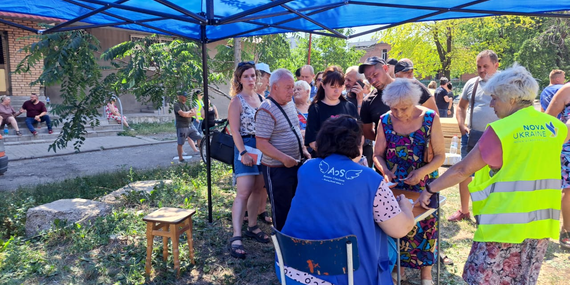Today's top news: Occupied Palestinian Territory, Ukraine, Afghanistan, Haiti

Occupied Palestinian Territory
Active conflict, access constraints, fuel restrictions, the ongoing power blackout, the lack of public order and safety and other challenges continue to impede the delivery of life-saving humanitarian assistance to Gaza's population in need.
OCHA says it is still extremely difficult to access areas north of Wadi Gaza, which requires coordination with the Israeli authorities and passage through an Israeli checkpoint.
During the first 16 days of July, our colleagues coordinated 60 humanitarian missions into the north. Only 24 were facilitated, while 12 were denied access by the Israeli authorities, and 20 others were impeded by Israeli troops on the ground. The remaining four missions were canceled by humanitarian organizations due to logistical, operational or security reasons.
This is preventing aid organizations from gaining regular access to the north, where hundreds of thousands of people need humanitarian assistance. It also makes it impossible for humanitarian workers to manage the flow of supplies into Gaza via the Erez West crossing.
Families across Gaza continue to face dire conditions, with limited access to hygiene and clean water.
UN Relief and Works Agency for Palestine Refugees in the Near East (UNRWA) reports that rashes and skin diseases are increasing across the Gaza Strip. Their teams are providing medication, but the agency warns that without improved conditions, the infections invariably return.
Currently, just 10 of UNRWA’s 26 health centres in Gaza are still operational. Despite this, UNRWA’s teams continue to risk their lives every day to provide medical care to families in need.
We also have an update on the West Bank. In updated figures, OCHA reports that more than 750 Palestinians have been displaced since the beginning of the year across the West Bank, after the Israeli authorities demolished or forced the demolition of their homes due to lack of building permits.
For that reason, more than 600 homes and other structures were demolished during that period.
OCHA reminds us that permits are rarely granted to Palestinians in Area C and East Jerusalem.
Meanwhile, OCHA reports that more than 740 Palestinians were displaced when their homes were damaged or destroyed during Israeli military operations, mostly in refugee camps of the northern West Bank.
OCHA says efforts are ongoing to support families whose homes were damaged during one such operation in the Nur Shams refugee camp last week. An assessment by OCHA and humanitarian partners found that military bulldozers damaged dozens of residential buildings and stores, as well as water and sewage networks.
Ukraine
Escalating hostilities in the Donetsk region, in the east of Ukraine, yesterday and today are once again forcing civilians to flee their homes. Local authorities have reported 30 civilian casualties and damage to civilian infrastructure.
The town of Pokrovsk has been especially hard hit, following several attacks over the last week. Authorities there say six civilians were injured yesterday alone. The UN and humanitarian partners who were on the ground today report that multiple houses, an education facility and a pharmacy were damaged.
They provided critical support, including materials for emergency repairs, as well as psychological and legal support to those affected by the attacks.
OCHA warns that as heavy fighting in Ukraine continues, the situation is getting worse. Authorities say that since last week, more than 1,500 people have left the front-line towns of Chasiv Yar and Toretsk.
Afghanistan
OCHA reports that heavy rainfall and flash flooding impacted the east and northeast of Afghanistan earlier this week, on Monday and Tuesday, 15 and 16 July.
Initial reports indicate that more than 40 people died and more than 250 others were injured, with 573 houses destroyed or damaged. OCHA says that at least 734 families require urgent humanitarian assistance.
The reception center at the Torkham border crossing, which serves as a main entry point for Afghans returning from Pakistan, has been heavily hit by the storm and rain. Water, sanitation and hygiene facilities and 400 tents at nearby Omari camp have been damaged or destroyed.
The UN and partners are coordinating with de facto authorities on the response. While assessments are ongoing, our humanitarian partners have deployed 9 mobile health and nutrition teams, while our health partners have provided medical supplies to Nangahar Regional Hospital and Fatima Zuhra Hospital.
Afghanistan is highly vulnerable to climate change, with more than 145,000 people having been impacted by heavy rains and flooding so far this year.
Additional funding is urgently required to support people affected by floods and to protect families living in the open or in makeshift shelters. To date, we have received some US$720 million – that is less than a quarter of what we need for this year’s $3 billion Humanitarian Needs and Response Plan in Afghanistan.
Haiti
OCHA remains deeply concerned about the plight of Haitian women and girls, who continue to bear the brunt of the deepening crisis in the country.
A new assessment by our humanitarian partners found that displaced women in Port-au-Prince are facing a wide range of challenges. Those sheltering at the six largest displacement sites in the capital said they urgently need critical assistance, especially food, health care, education, livelihood support, and protection services, including to address gender-based violence.
Women and girls account for more than half of the nearly 580,000 people now displaced in Haiti. Violence by armed groups continues to force people from their homes, with the Government imposing a state of emergency in two departments yesterday – Artibonite and Ouest, where Haiti’s capital is located.
OCHA says the UN continues to work with Haitian agencies to provide water, hygiene kits, and psychological support to women. UNICEF, UN Women, and the UN Population Fund are among the UN agencies reaching displaced communities with critical assistance.
This is despite severe funding constraints: The 2024 humanitarian appeal for Haiti is less than a quarter funded more than halfway through the year, with just $161 million received so far of the $674 million needed.
